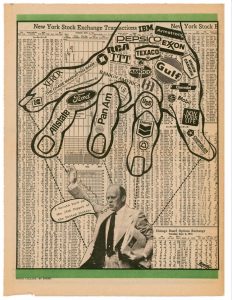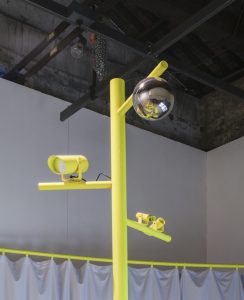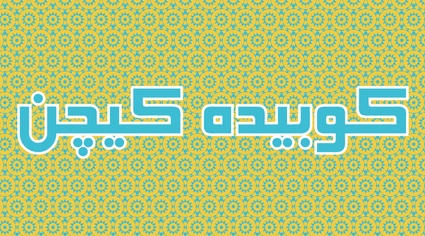 Pittsburgh… A city of little more than 300,000 inhabitants. Until now i wasn’t even able to locate it precisely on a map of the USA. The place is nevertheless popping up on my radar for the second time this year. It’s high time i do something about my ignorance.
Pittsburgh… A city of little more than 300,000 inhabitants. Until now i wasn’t even able to locate it precisely on a map of the USA. The place is nevertheless popping up on my radar for the second time this year. It’s high time i do something about my ignorance.
A few months ago artists John Peña, Jon Rubin, and Dawn Weleski opened Conflict Kitchen, a take-out restaurant that only serves cuisine from countries that the United States is in conflict with. Nowadays the Iranian food is served at the counter. More precisely, the kubideh, a dish made of grilled ground meat in freshly baked barbari bread with onion, mint, and basil. The food is wrapped in a paper covered with facts about Iran, its government, culture and the way the U.S. perceives it. Every four month, a new country takes center stage. For each iteration of Conflict Kitchen, events, performances, and discussion will explore further the culture, politics, and issues at stake.
I found the idea so smart and inspiring that i asked Jon, Dawn and John if i could interview them briefly:
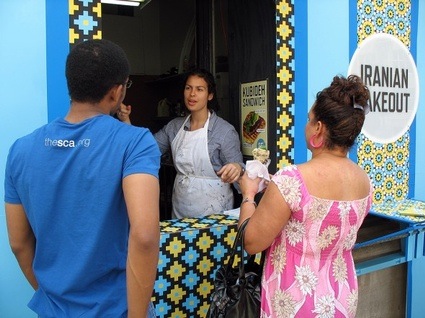 What has been the response to Conflict Kitchen so far? in the press and among passersby? Do people come back and discuss Iranian culture, food or political issues?
What has been the response to Conflict Kitchen so far? in the press and among passersby? Do people come back and discuss Iranian culture, food or political issues?
The response to the project locally and in the press has been pretty amazing so far. The national and international press has been quite receptive to presenting the project, and this has ultimately led to a great breadth of discussion on the web. Locally, the take-out window has been very busy with between 40-70 customers coming by a day. Many people are unfamiliar with the food, but are surprisingly game to try it. Conversation about the project always seems to start with what do you serve, and then, when we describe the larger project, people start listing to us the other countries they think we should be focusing on after Iran. After that the conversation naturally goes to Iranian culture–perceptions and misperceptions–and often back to the customer’s own cultural heritage. Already after a month in operation, and with a lot of local press, we’ve become a place where people from all over Pittsburgh come to discuss U.S. and Iranian politics and culture. We still have plenty of people who have never heard of the project come by, and, as small groups form outside the take-out window, it often catalyzes a natural public forum. We are very popular with the local Iranian community, as there are no Persian restaurants in the city, and many of the local Iranians are sympathetic to the way the project introduces locals to a more nuanced view of Iranian culture and daily life. Conversations have taken place between Iranians living in Pittsburgh and Pittsburghers who have never left the city, as well as everyone in between. We also present a series of programming that we have begun to host, including the first event, a dinner party between Tehran and Pittsburgh via live video chat, that allows for an even greater audience and, we think, greater depth of conversation.
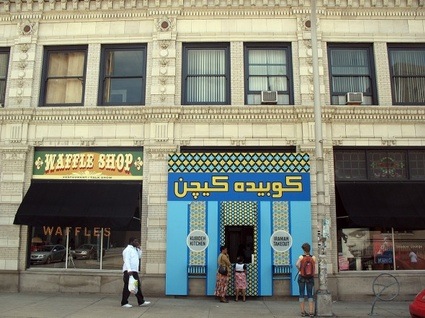 Does the take-away attract customers who would normally not enter the Waffle Shop maybe because they associate it too much with art and university?
Does the take-away attract customers who would normally not enter the Waffle Shop maybe because they associate it too much with art and university?
Most people, in our experience, don’t associate the Conflict Kitchen with art or with the university. As for the Waffle Shop, many Pittsburghers still aren’t sure what it is exactly, but are curious enough to stop in. In conversation with folks about the Waffle Shop, we don’t immediately present it as an “art project” or “university project,” we simply tell them that we are a neighborhood waffle shop that also produces a live-streaming talk show that they can be on. If they have further questions, we are more than willing to reveal and discuss any aspects of the project.
Conflict Kitchen has initially drawn people because of the striking visual of the facade. We’ve had quite a few people stop their cars in the middle of the street, get out, and inquire “What is this?”. Lots of Iranians have immediately read the Farsi on the sign and wonder if we really serve kubideh. The general mission, one could say of both eateries, is to stimulate public dialogue. They provide a forum for conversations that might not normally take place between folks who might not normally meet. Obviously, Conflict Kitchen stimulates a much more specific conversation but, again, is connecting everyday people and highlighting their thoughts and perspectives, not their government’s or their media’s, about Iranian culture.
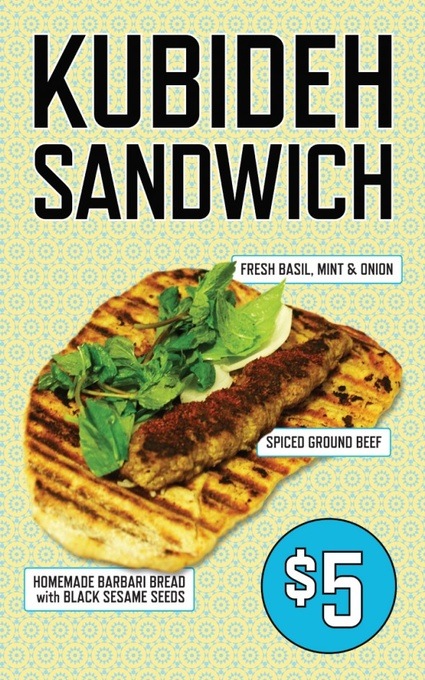 Only one type of food is served and CK will rotate identities every 4 months to focus on another country. Which countries will come next?
Only one type of food is served and CK will rotate identities every 4 months to focus on another country. Which countries will come next?
Most likely, we will follow up Kubideh Kitchen with Afghan cuisine, followed by North Korea, and then perhaps Venezuela. Really, the take-out restaurant could go on for years, with the conflicts the U.S. is currently involved in.
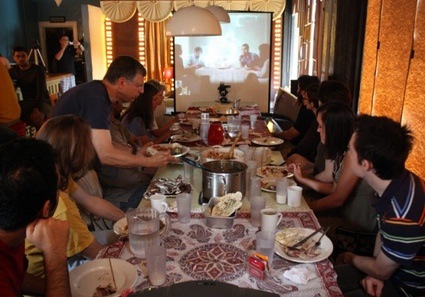 Each Conflict Kitchen comes with a series of events and discussion about the culture and issues at stake with each county. I saw on the Conflict Kitchen blog that you already had a Live Skype Meal between Pittsburgh and Tehran. Which kind of other events are you preparing?
Each Conflict Kitchen comes with a series of events and discussion about the culture and issues at stake with each county. I saw on the Conflict Kitchen blog that you already had a Live Skype Meal between Pittsburgh and Tehran. Which kind of other events are you preparing?
There will be programming for each Conflict Kitchen iteration, hosted at the Waffle Shop. Yes, we just hosted a meal with Pittsburgh and Tehran via live video conferencing (Skype) on Sat., June 5. We invited people to join us for a virtual dinner party with Tehran. A menu was planned with a gallery owner in Tehran that reflected a breadth of traditional Iranian food. Folks in Tehran were invited to join in on the meal that happened concurrently here in Pittsburgh at the Waffle Shop. The event was two hours long and between 30-40 people attended on each end. The conversation ranged from food, to dating, to politics. Our next event will be another live video feed with Tehran in the form of a YouTube video essay, curated by Jon Rubin in Pittsburgh and Sohrab Kashani in Tehran, that highlights uploaded videos by residents of both cities, and will take place Saturday, July 10 at 11.30a. The videos will alternate between Pittsburgh and Tehran, comparing and contrasting the culture of each city. Connected through live video conferencing, the attendees of the event in both cities will then engage in discussion about the cultural and societal morays presented in the videos and YouTube as a resource of both cultural presentation and misrepresentation.
Additional events will include: traditional Persian instrumentalists v. popular Persian music videos and pop music; film screenings from Iranian directors; a forum and discussion on blogging and social media in Iran, and it’s role in the Green Movement; and a culminating event in collaboration with local organizations on Pittsburgh’s first-ever Persian Cultural Festival.
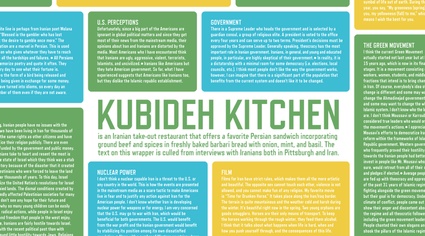 I had a look at the wrapping of the kubideh. Each topic approached is narrated from a 1st person point of view. Who is this person? Why do you think that it is a better way to start a dialogue with the public?
I had a look at the wrapping of the kubideh. Each topic approached is narrated from a 1st person point of view. Who is this person? Why do you think that it is a better way to start a dialogue with the public?
The wrapper is culled from interviews that we conducted with many different Iranians in both Iran and Pittsburgh. It provides multiple, and often contrasting, opinions and perspectives about a variety of cultural and political topics. Conflict Kitchen initiates a conversational, and often first person account, of the everyday life of people who are often presented in simplified and polarizing nightly news clips.
Our food, subtly embedded with the history of a culture, is the first, sensorial invitation for engagement with the public. The food, in addition to the wrapper and our programming, help to break through the mental boundaries that many people have about places like Iran, and create a platform for a more nuanced discussion of culture and politics.
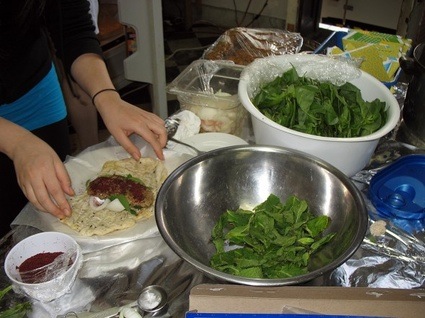 Any plan to open Conflict Kitchen in other US cities?
Any plan to open Conflict Kitchen in other US cities?
It’s a bit bizarre: we’ve received invitations from cities around the globe, as well as in the U.S., to create Conflict Kitchens. We have been debating creating the project in other locations, including at professional sports parks and arenas or attached to the backdoors of other restaurants. We even got an email from a family in Arizona, discussing their intentions to host their own Conflict Kitchen dinner every Monday night, with highlighted country/cuisine/culture chosen by their seven year old. It’s satisfying to see the premise reformed and modeled by other members of the public.
Thanks Jon, John and Dawn!
And thanks to the always excellent Social Design Notes where i discovered the existence of Conflict Kitchen.


